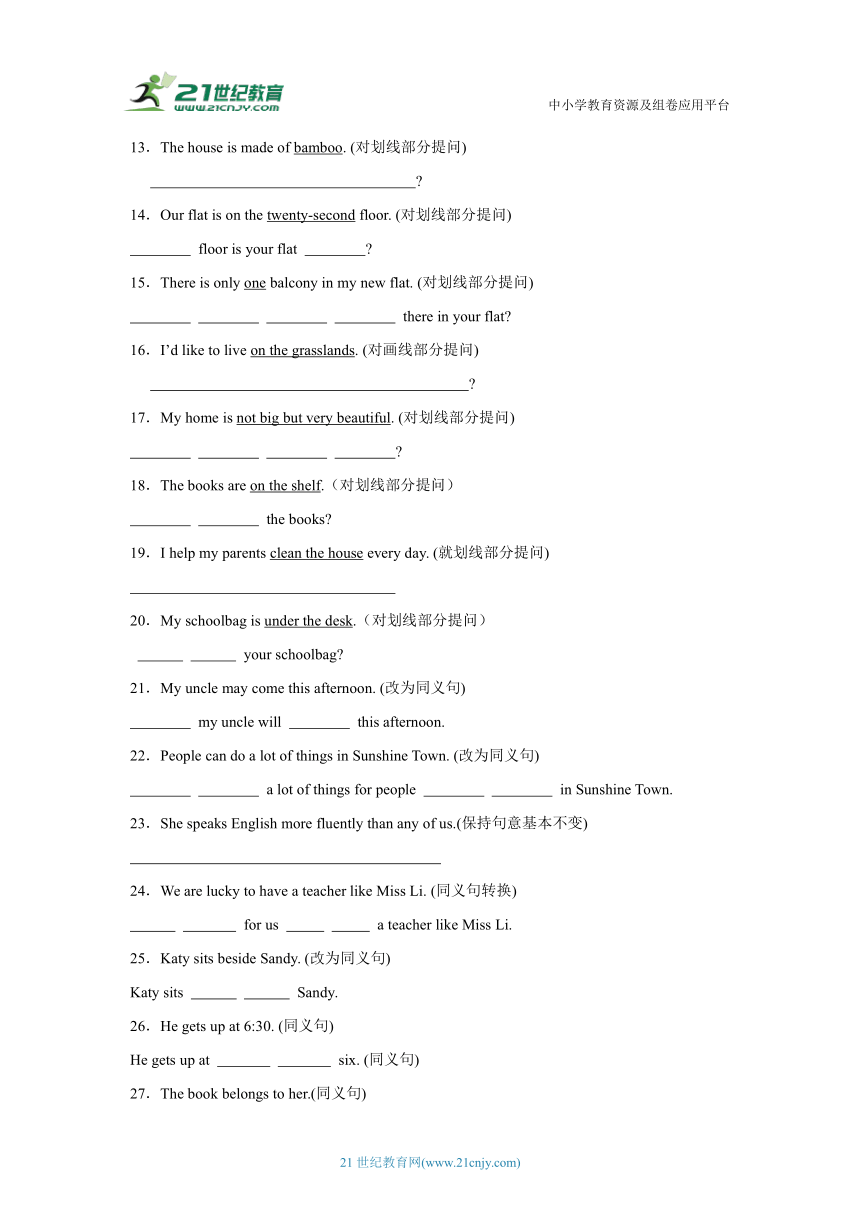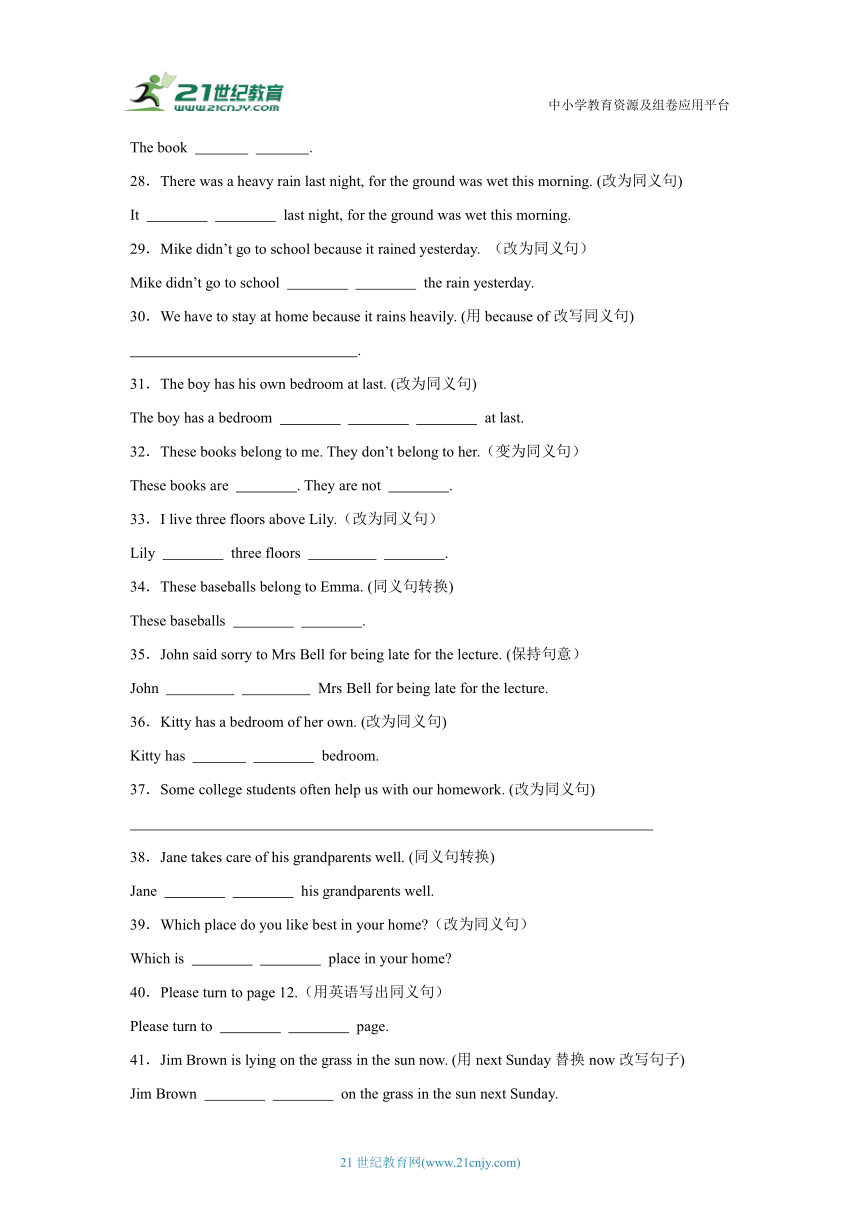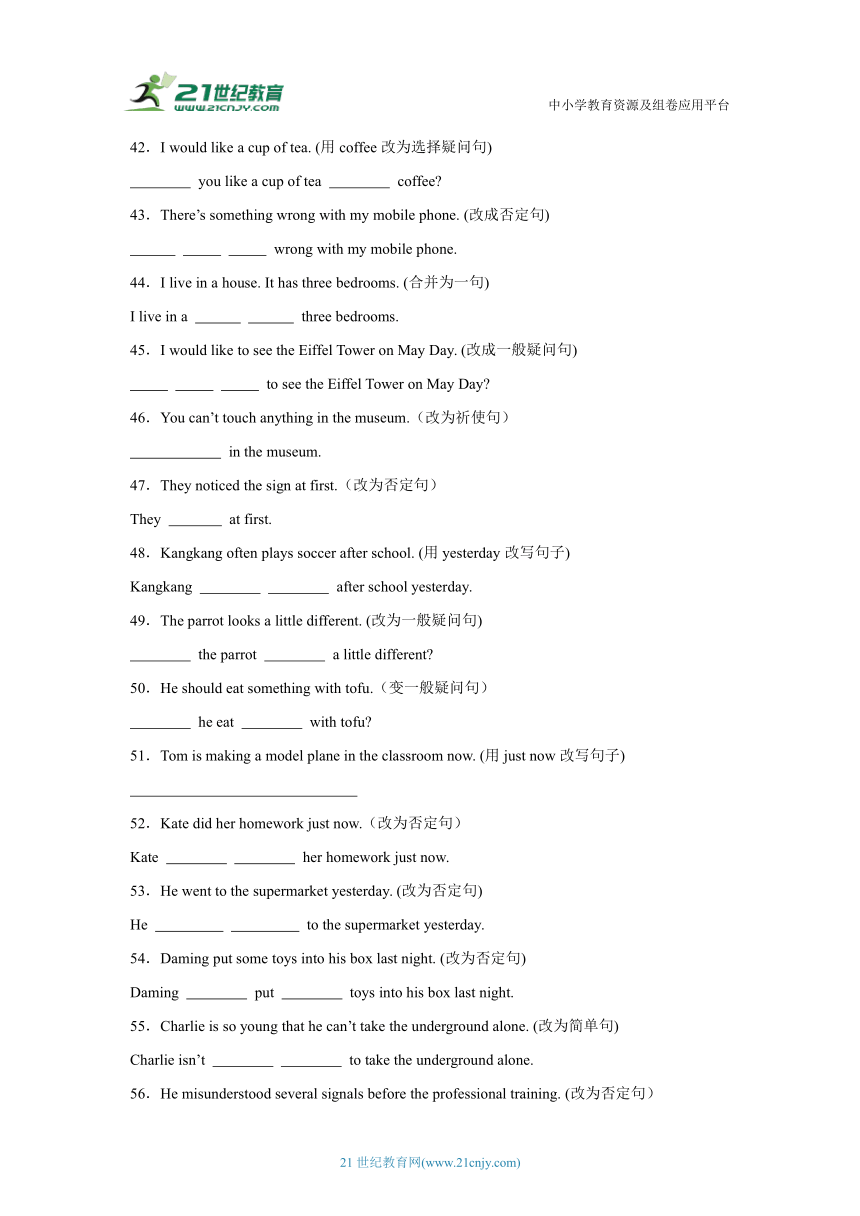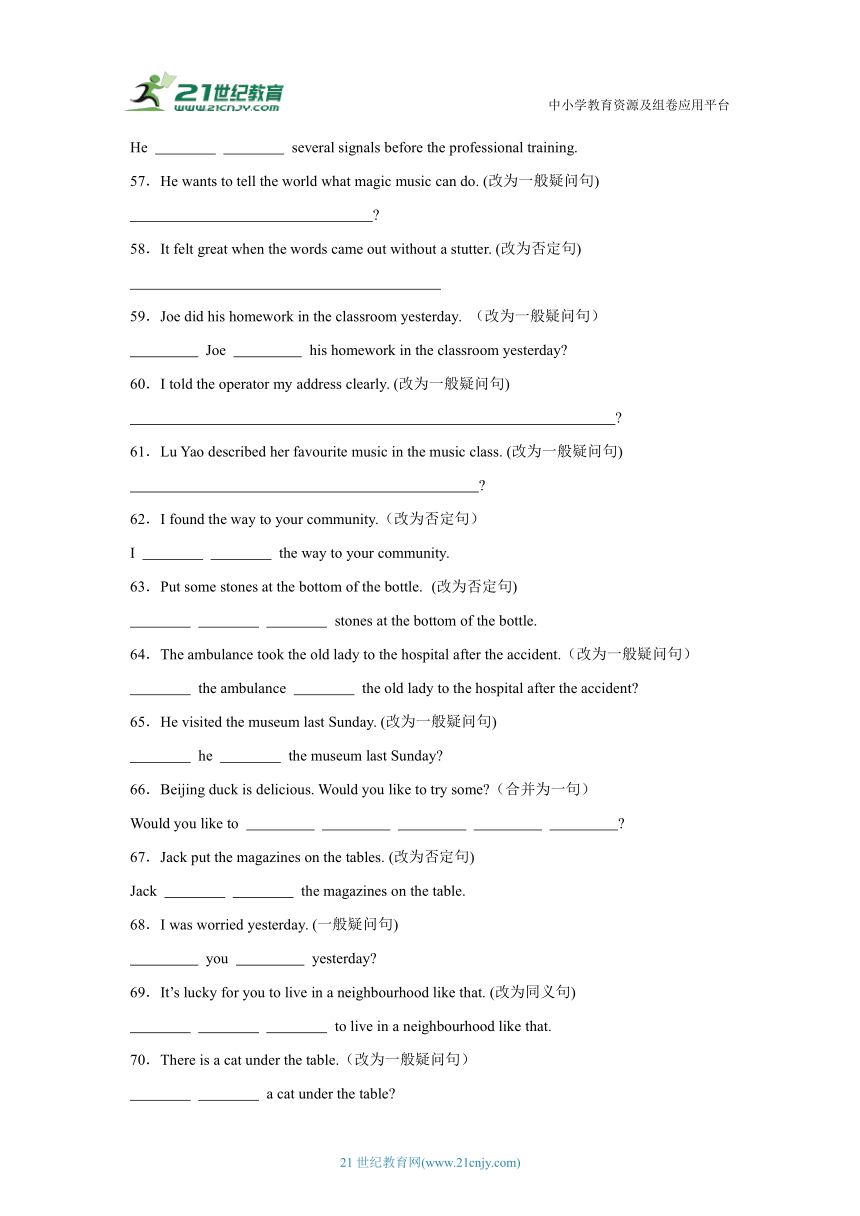(期末考点培优)专题07 句型转换-2024-2025学年七年级英语下册期末复习考点培优专项译林版(2024)(含答案解析)
文档属性
| 名称 | (期末考点培优)专题07 句型转换-2024-2025学年七年级英语下册期末复习考点培优专项译林版(2024)(含答案解析) |  | |
| 格式 | docx | ||
| 文件大小 | 64.4KB | ||
| 资源类型 | 试卷 | ||
| 版本资源 | 译林版 | ||
| 科目 | 英语 | ||
| 更新时间 | 2025-05-22 23:34:15 | ||
图片预览





文档简介
中小学教育资源及组卷应用平台
中小学教育资源及组卷应用平台
2024-2025学年七年级英语下册期末复习专项译林版(2024)
(期末考点培优)专题07 句型转换
学校:___________姓名:___________班级:___________考号:___________
1.I’m going to go shopping with my mother tomorrow. (对画线部分提问)
tomorrow?
2.Sheep were domesticated because they were a good source of meat.(对划线部分提问)
sheep domesticated
3.I would like one tin of dog food. (对画线部分提问)
of dog food you like
4.It’s ten minutes on foot from my school to the bus stop. (对画线部分提问) is it from your school to the bus stop
5.Tom telephoned his parents yesterday. (对划线部分提问)
his parents
6.Tommy took a deep breath to calm himself down.(划线部分提问)
7.It took me 10 days to finish this project. (对划线部分提问)
8.I would like to recommend a classic musical Cinderella《灰姑娘》. (对划线部分提问)
9.They celebrated their victory by waving the flags. (对划线部分提问)
10.We will have the food festival on Friday afternoon. (对划线部分提问)
11.Visitors can get a taste of the past by walking through the hutong. (对划线部分提问)
get a taste of the past
12.His phone number is 1891231231. (对划线部分提问)
his phone number
13.The house is made of bamboo. (对划线部分提问)
14.Our flat is on the twenty-second floor. (对划线部分提问)
floor is your flat
15.There is only one balcony in my new flat. (对划线部分提问)
there in your flat
16.I’d like to live on the grasslands. (对画线部分提问)
17.My home is not big but very beautiful. (对划线部分提问)
18.The books are on the shelf.(对划线部分提问)
the books
19.I help my parents clean the house every day. (就划线部分提问)
20.My schoolbag is under the desk.(对划线部分提问)
your schoolbag
21.My uncle may come this afternoon. (改为同义句)
my uncle will this afternoon.
22.People can do a lot of things in Sunshine Town. (改为同义句)
a lot of things for people in Sunshine Town.
23.She speaks English more fluently than any of us.(保持句意基本不变)
24.We are lucky to have a teacher like Miss Li. (同义句转换)
for us a teacher like Miss Li.
25.Katy sits beside Sandy. (改为同义句)
Katy sits Sandy.
26.He gets up at 6:30. (同义句)
He gets up at six. (同义句)
27.The book belongs to her.(同义句)
The book .
28.There was a heavy rain last night, for the ground was wet this morning. (改为同义句)
It last night, for the ground was wet this morning.
29.Mike didn’t go to school because it rained yesterday. (改为同义句)
Mike didn’t go to school the rain yesterday.
30.We have to stay at home because it rains heavily. (用because of改写同义句)
.
31.The boy has his own bedroom at last. (改为同义句)
The boy has a bedroom at last.
32.These books belong to me. They don’t belong to her.(变为同义句)
These books are . They are not .
33.I live three floors above Lily.(改为同义句)
Lily three floors .
34.These baseballs belong to Emma. (同义句转换)
These baseballs .
35.John said sorry to Mrs Bell for being late for the lecture. (保持句意)
John Mrs Bell for being late for the lecture.
36.Kitty has a bedroom of her own. (改为同义句)
Kitty has bedroom.
37.Some college students often help us with our homework. (改为同义句)
38.Jane takes care of his grandparents well. (同义句转换)
Jane his grandparents well.
39.Which place do you like best in your home (改为同义句)
Which is place in your home
40.Please turn to page 12.(用英语写出同义句)
Please turn to page.
41.Jim Brown is lying on the grass in the sun now. (用next Sunday替换now改写句子)
Jim Brown on the grass in the sun next Sunday.
42.I would like a cup of tea. (用coffee改为选择疑问句)
you like a cup of tea coffee
43.There’s something wrong with my mobile phone. (改成否定句)
wrong with my mobile phone.
44.I live in a house. It has three bedrooms. (合并为一句)
I live in a three bedrooms.
45.I would like to see the Eiffel Tower on May Day. (改成一般疑问句)
to see the Eiffel Tower on May Day
46.You can’t touch anything in the museum.(改为祈使句)
in the museum.
47.They noticed the sign at first.(改为否定句)
They at first.
48.Kangkang often plays soccer after school. (用yesterday改写句子)
Kangkang after school yesterday.
49.The parrot looks a little different. (改为一般疑问句)
the parrot a little different
50.He should eat something with tofu.(变一般疑问句)
he eat with tofu
51.Tom is making a model plane in the classroom now. (用just now改写句子)
52.Kate did her homework just now.(改为否定句)
Kate her homework just now.
53.He went to the supermarket yesterday. (改为否定句)
He to the supermarket yesterday.
54.Daming put some toys into his box last night. (改为否定句)
Daming put toys into his box last night.
55.Charlie is so young that he can’t take the underground alone. (改为简单句)
Charlie isn’t to take the underground alone.
56.He misunderstood several signals before the professional training. (改为否定句)
He several signals before the professional training.
57.He wants to tell the world what magic music can do. (改为一般疑问句)
58.It felt great when the words came out without a stutter. (改为否定句)
59.Joe did his homework in the classroom yesterday. (改为一般疑问句)
Joe his homework in the classroom yesterday
60.I told the operator my address clearly. (改为一般疑问句)
61.Lu Yao described her favourite music in the music class. (改为一般疑问句)
62.I found the way to your community.(改为否定句)
I the way to your community.
63.Put some stones at the bottom of the bottle. (改为否定句)
stones at the bottom of the bottle.
64.The ambulance took the old lady to the hospital after the accident.(改为一般疑问句)
the ambulance the old lady to the hospital after the accident
65.He visited the museum last Sunday. (改为一般疑问句)
he the museum last Sunday
66.Beijing duck is delicious. Would you like to try some (合并为一句)
Would you like to
67.Jack put the magazines on the tables. (改为否定句)
Jack the magazines on the table.
68.I was worried yesterday. (一般疑问句)
you yesterday
69.It’s lucky for you to live in a neighbourhood like that. (改为同义句)
to live in a neighbourhood like that.
70.There is a cat under the table.(改为一般疑问句)
a cat under the table
71.There is a bank near my home. (改为一般疑问句)
a bank near your home
72.There is a pen on the desk. (改为一般疑问句)
a pen on the desk
73.Someone can live in such difficult conditions.(改为一般疑问句)
live in such difficult conditions
74.My family live in a new house. The house has a big garden. (合并为一句)
My family live in a big garden.
75.The Olympic Park has colourful lights. At night, it’s very beautiful.(用介词合并为一句)
At night, the Olympic Park is very beautiful .
76.There is something wrong with my bike. (改为否定句)
There is with my bike.
77.There is something wrong with my mobile phone. (改为否定句)
There is with my mobile phone.
78.She is going to write a letter to her friend. (改为否定句)
She going to write a letter to her friend.
79.All of them like singing. (改为否定句)
of them singing.
80.There are going to be two matches this week. (改为一般疑问句)
there to be two matches this week
中小学教育资源及组卷应用平台
中小学教育资源及组卷应用平台
21世纪教育网(www.21cnjy.com)
21世纪教育网(www.21cnjy.com)
参考答案及试题解析
1.What are you going to do
【解析】句意:明天我要和妈妈一起去购物。划线部分为要做的事,应用疑问词what提问;特殊疑问句结构为:特殊疑问词+一般疑问句;原句为一般将来时,一般疑问句结构为:be+主语+going to+动词原形+其他;主语是you,谓语用are going to do。故填What are you going to do。
2.Why were
【解析】句意:羊被驯化是因为它们是很好的肉食来源。 根据下划线部分“because they were a good source of meat.”可知,此处应该提问羊被驯化的原因,why“为什么”,提问原因,位于句首,首字母要大写,且该句时态为一般过去时,主语是sheep,所以此处谓语动词要用were。故填Why;were。
3.How many tins would
【解析】句意:我想要一罐狗粮。划线部分是数量,tin是可数名词,用how many提问,后跟可数名词复数tins;“I would like”的特殊疑问句结构为:特殊疑问词+would+you+like。故填How;many;tins;would。
4.How far
【解析】句意:从学校到公交车站步行十分钟。根据划线部分“ten minutes on foot”可知,此处是对距离进行提问,应用疑问词组how far,表示“多远”,且位于句首的单词首字母要大写,故填How;far。
5.When did Tom telephone
【解析】句意:汤姆昨天给他父母打了电话。划线部分为时间,对时间“yesterday”提问需用疑问词when;原句为一般过去时,疑问句结构为:When+did+主语+动词原形+其他,将原句中的动词telephoned变为原形telephone,句首单词首字母大写。故填When did Tom telephone。
6.Why did Tommy take a deep breath
【解析】句意:汤米深吸了一口气,使自己平静下来。划线部分表示目的,用疑问词Why提问,原句时态为一般过去时,需用助动词did构成疑问句。结构为:Why did+主语+动词原形+其他。故填Why did Tommy take a deep breath。
7.How long did it take you to finish this project
【解析】句意:我花了10天完成这个项目。划线部分表示时间段,对时间段提问用How long“多久”,后跟一般疑问句,由“took”可知,时态是一般过去时,疑问句需借助助动词did,置于主语之前,后实义动词用原形take;其余不变。故填How long did it take you to finish this project
8.What would you like to recommend
【解析】句意:我想推荐一部经典音乐剧《灰姑娘》。根据划线部分可知,此处应用what提问,变成疑问句时要把would提到主语前,原句主语是“I”,提问时需改为“you”,故填What would you like to recommend。
9.How did they celebrate their victory
【解析】句意:他们通过挥舞旗帜来庆祝胜利。划线部分是“by waving the flags”,表示庆祝的方式,对方式提问用“How”,句首首字母大写;时态为一般过去时,借助助动词did位于主语“they”前面,其他部分不变。故填How did they celebrate their victory。
10.When will you have the food festival
【解析】句意:我们将在星期五下午举行美食节。划线部分是“on Friday afternoon”,对时间提问用when“什么时候”,句首首字母大写;助动词will提前到主语“we”前;该疑问句“we”要改成“you”;其余部分保持不变。故填When will you have the food festival。
11.How can visitors
【解析】句意:游客可以通过步行穿过胡同来体验过去的味道。划线部分“by walking through the hutong”表示方式,对方式提问用“How”,放在句首首字母要大写。本句是一般现在时,助动词“can”用于疑问句时需提到主语前,主语为“visitors”,谓语动词“get”保持原形。故填How;can;visitors。
12.What is
【解析】句意:他的电话号码是1891231231。划线部分为电话号码,对其提问应用疑问词what,句首首字母大写;陈述句中be动词is提到主语前。故填What;is。
13.What is the house made of
【解析】句意:这个房子是用竹子建成的。划线部分bamboo“竹子”是事物,应用“What”提问,其余部分“The house is made of”应变为一般疑问句,此句含有be动词“is”,直接把“is”提前即可,因此整个句子为What is the house made of “这个房子是用什么建成的?”。故填What is the house made of。
14.Which on
【解析】句意:我们的公寓在22楼。划线部分“twenty-second”表示具体的楼层,提问时用“which”来询问具体的位置,放在句首首字母要大写。且介词“on”需要保留。故填Which;on。
15.How many balconies are
【解析】句意:我的新公寓里只有一个阳台。在“there be”句型中,当对可数名词的数量提问时,要用“How many+可数名词复数+are there+地点”的结构。“balcony”是可数名词,其复数形式是“balconies”,所以这里用“How many balconies are”来提问。故填How;many;balconies;are。
16.Where would you like to live
【解析】句意:我想住在草原上。画线部分是地点状语,表示居住的地点。对地点状语提问时,应使用疑问词where,句首首字母大写;原句中的I’d是I would的缩写,在疑问句中,需将would置于疑问词Where之后,I转换成you,置于would之后,like to live置于you之后。故填Where would you like to live。
17.What’s your home like
【解析】句意:我的家不大但很漂亮。划线部分是“not big but very beautiful”,对此提问用“What’s your home like ”。句首首字母大写。故填What’s;your;home;like。
18.Where are
【解析】句意:书在书架上。划线部分on the shelf是地点,对其提问应用特殊疑问词where,位于句首,然后把are放到主语the books之前。故填Where;are。
19.What do you help your parents do every day
【解析】句意:我每天帮助我父母打扫屋子。划线部分“clean the house”是一个动作,应用“What…do”提问,特殊疑问词“What”置于句首,其余部分“I help my parents do every day”变为一般疑问句,此句为一般现在时,主语是“I”,助动词应用“do”,变问句时第一人称“I”应变为第二人称“you”,“my”变为“your”,因此整句为What do you help your parents do every day “你每天帮助你的父母做什么?”。故填What do you help your parents do every day
20.Where is
【解析】句意:我的书包在桌子下面。划线部分是“under the desk”,对地点提问用“Where”。句首首字母大写。故填Where;is。
21.Maybe come
【解析】句意:我叔叔今天下午可能会来。分析题干,该句为含有情态动词may“也许”的陈述句,改为同义句时可用副词maybe表示“可能”,句首首字母大写,且will后应接动词原形。故填Maybe;come。
22.There are to do
【解析】句意:在阳光镇,人们可以做很多事情。根据题干可知,同义句可采用There be句型,时态是一般现在时;同义句的主语a lot of things表示复数,所以应用be动词are;there are a lot of things to do“有很多事情要做”,应用动词不定式to do。故填There;are;to;do。
23.She speaks English the most fluently among us.
【解析】句意:她说英语比我们所有人都流利。保持句意不变可表达为,她在我们当中是讲得最流利的那个,用最高级形式即“the most fluently”。故填She speaks English the most fluently among us.
24.It’s lucky to have
【解析】句意:我们很幸运能有李老师这样的老师。原句表达“我们很幸运拥有李老师这样的老师”,转换同义句时,可以使用“It's + 形容词 + for sb. + to do sth.”的结构,其中“It”作为形式主语,真正的主语是后面的不定式短语“to have a teacher like Miss Li”,“lucky”作为形容词描述这种幸运的状态,整个结构表达“对于我们来说,拥有李老师这样的老师是幸运的”。故填It’s;lucky;to;have。
25.next to
【解析】句意:Katy坐在Sandy旁边。改成同义句时,原句中beside“在……旁边”与next to“挨着”意思相近,可替换。故填next;to。
26.half past
【解析】句意:他在6点半起床。六点半:half past six。故填half;past。
27.is hers
【解析】句意:这本书属于她。即“这本书是她的”,句子用一般现在时,主语是the book,be动词用is,表语是名词性物主代词hers“她的”。故填is;hers。
28.rained heavily
【解析】句意:昨晚下了一场大雨,因为今早地面是湿的。原句“there was a heavy rain”是“there be”句型,表示“有一场大雨”;可改为it作主语,rain作谓语动词,heavily是副词修饰动词rained,表示雨下得程度。故填rained;heavily。
29.because of
【解析】句意:迈克昨天没去上学,因为下雨了。“because”引导原因状语从句,后面接句子;“because of” 意思也是“因为”,但后面接名词、代词或动名词等。原句中“it rained”是句子,而改写后的句子中“the rain”是名词,所以用“because of”来替换“because”引导原因,故填because;of。
30.We have to stay at home because of the heavy rain
【解析】句意:因为雨下得很大,我们不得不待在家里。原句中的“because it rains heavily”表示原因,可以改写为because of + 名词/名词短语"的形式,“it rains heavily”可以转换为名词短语“the heavy rain”。故填We have to stay at home because of the heavy rain。
31.of his own
【解析】句意:这个男孩终于有了自己的卧室。of one’s own“属于某人自己的”,替换原句中的“his own”。故填of;his;own。
32.mine hers
【解析】句意:这些书是我的。它们不属于她。根据“These books belong to me”可知,这些书是我的。空处可用名词性物主代词mine“我的”;根据“They don’t belong to her”可知,它们不是她的。空处可用名词性物主代词hers“她的”,故填mine;hers。
33.lives below me
【解析】句意:我住在莉莉楼上三层。根据“I live three floors above Lily”可知,表示我住在莉莉楼上三层,此处还可以表达为“莉莉住在我楼下三层”。below“在……下方”,me“我”,live“居住”,此处时态为一般现在时,主语Lily为三单,故谓语动词应用三单形式lives。故填lives;below;me。
34.are Emma’s
【解析】句意:这些棒球属于Emma。belong to“属于”,表示所属关系,可以转换为名词所有格形式,用Emma’s表示,意为“Emma的”;主语为“These baseballs”,为复数,因此be动词用are。故填are;Emma’s。
35.apologised to
【解析】句意:约翰为上课迟到向贝尔太太道歉。“say sorry to”可以用“apologise to”替换,两者均表示“向……道歉”。时态是一般过去时,动词用过去式。故填apologised;to。
36.her own
【解析】句意:凯蒂有自己的卧室。根据“Kitty has a bedroom of her own.”可知,此处指的是凯蒂有自己的卧室。her“她的”,own“自己的”,形容词作定语修饰名词“bedroom”,符合语境。故填her;own。
37.Some college students often help us do our homework./Some college students often help us to do our homework.
【解析】句意:一些大学生经常帮助我们做家庭作业。help sb with sth“帮助某人做某事”,等同于help sb do/to do sth。故填Some college students often help us do our homework./Some college students often help us to do our homework.
38.looks after
【解析】句意:Jane把他的祖父母照顾得很好。对比两句话可知,空格处应替换原句的“takes care of…”,意为“照顾得好”,此处是第三人称单数形式,可用同义短语looks after...。故填looks;after。
39.your favorite/favourite
【解析】句意:你最喜欢家里的哪个地方?like best意为“最喜欢”,可以换成形容词favorite或favourite,表示“最喜欢的”;用形容词性物主代词your表示“你的”。故填your;favorite/favourite。
40.the twelfth
【解析】句意:请翻到第十二页。根据两句对照可知,此处缺少“第十二”,英文表达为twelfth,序数词前加the。故填the;twelfth。
41.will lie
【解析】句意:吉姆·布朗现在正躺在草地上晒太阳。原句是现在进行时,要求把时间状语改为“next Sunday”,该句应该改为一般将来时,其结构为“will do”,因此填will,后接动词原形lie。故填will;lie。
42.Would or
【解析】句意:我想要一杯茶。would like“想要”,would是情态动词,改为疑问句时,将would置于句首,首字母要大写;选择疑问句需要连词or,表示选择。故填Would;or。
43.There isn’t anything
【解析】句意:我的手机出问题了。原句为肯定句,使用there be句型表示“存在有”,be动词为is,改为否定句时,需在is后加not,即isn’t;同时,肯定句中的something(某事/某物)在否定句中需变为anything(任何事/物),表示“没有任何事/物出问题”。“There”保持不变。故填There;isn’t;anything。
44.house with
【解析】句意:我住在一个有三间卧室的房子里。根据原句中“I live in a house.” 可知,第一空使用house;原句中it代指第一句中house,所以it has three bedrooms可以用介词短语表示“有三个卧室的房子” 即with three bedrooms。故填house ; with。
45.Would you like
【解析】句意:我想在五一节去看埃菲尔铁塔。变为一般疑问句,需要把would放在句首,I需要变为you。故填Would;you;like。
46.Don’t touch anything
【解析】句意:你不能碰博物馆里的任何东西。按照要求,改为祈使句,即“不要碰博物馆里的任何东西”;Don’t do sth“不要做某事”,故填Don’t touch anything。
47.didn’t notice the sign/did not notice the sign
【解析】句意:他们起初注意到了这个标志。根据过去式“noticed”可知,原句为含实义动词的一般过去时,应借助助动词did not(缩写为didn’t)构成否定句,其后接动词原形notice“注意到”;宾语“the sign”不做改动。故填didn’t notice the sign/did not notice the sign。
48.played soccer
【解析】句意:康康经常放学后踢足球。根据“Kangkang often plays soccer after school.”可知,原句是一般现在时,用“yesterday”改写需变为一般过去时。“play”的过去式为“played”,其他成分不变。故填played;soccer。
49.Does look
【解析】句意:这只鹦鹉看起来有点不同。改为一般疑问句,此句是含有实义动词的一般现在时,主语“The parrot”是第三人称单数,改为一般疑问句应在句首加助动词“Does”,助动词出现,动词需变回原形,因此第二空填“look”。故填Does;look。
50.Should anything
【解析】句意:他应该吃点带豆腐的东西。变一般疑问句时,只需把情态动词should提到句首,首字母大写;something用于肯定句,否定句和疑问句中需要改成anything。故填Should;anything。
51.Tom made a model plane in the classroom just now.
【解析】句意:汤姆现在正在教室里做飞机模型。根据“Tom is making a model plane in the classroom now.”可知,原句为现在进行时,表示正在进行的动作。just now表示“刚才”,是一般过去时的时间标志词。将句子用just now改写,需要把现在进行时is making改为一般过去时,make的过去式是made,同时去掉now,添加just now。故填Tom made a model plane in the classroom just now.
52.didn’t do
【解析】句意:凯特刚才做了作业。根据分析句子“Kate did her homework just now.”可知,时态为一般过去时,该句变否定句,需要借助助动词didn’t,后跟动词原形do即可。故填didn’t;do。
53.didn’t go
【解析】句意:他昨天去了超市。原句时态为一般过去时,句中含有实义动词“went”,变为否定句,要借助于助动词did的否定形式didn’t,其后用“went”的原形go。故填didn’t;go。
54.didn’t any
【解析】句意:大明昨晚把一些玩具放进了他的盒子里。原句为一般过去时,改为否定句时,需添加助动词didn’t,肯定句中的some在否定句中需改为any。故填didn’t;any。
55.old enough
【解析】句意:Charlie是如此地年轻以至于他不能独自乘坐地铁。原句是复合句“so…that…”结构,改为简单句时,可用“not + 形容词 + enough to do”的结构,表示“不够……以至于不能……”;原句中的young“年轻的”需转化为反义词old“年长”。故填old;enough。
56.didn’t misunderstand
【解析】句意:在专业培训之前,他误解了几个求助信号。原句是一般过去时,否定句需要借助助动词didn’t,后跟动词原形misunderstand。故填didn’t;misunderstand。
57.Does he want to tell the world what magic music can do
【解析】句意:他想告诉世界魔术音乐能做什么。原句谓语“wants”为实义动词,且为三单形式,改为一般疑问句时,需借助助动词does,放置句首,首字母大写,主语后接动词原形want,其他不变。故填Does he want to tell the world what magic music can do。
58.It didn’t feel great when the words came out without a stutter.
【解析】句意:当话语流畅地脱口而出时,感觉真好。根据“felt”可知,时态是一般过去时,否定句需借助助动词didn’t,后实义动词用原形feel,其余不变。故填It didn’t feel great when the words came out without a stutter.
59.Did do
【解析】句意:乔昨天在教室里做了他的家庭作业。原句是一般过去时,谓语动词是实义动词“did”,变一般疑问句时,需要借助助动词“did”,并把助动词提前到句首,首字母大写,原来的谓语动词“did”要还原为原形“do”。故填Did;do。
60.Did you tell the operator your address clearly
【解析】句意:我清楚地告诉了操作员我的地址。原句时态为一般过去时,且谓语动词为实义动词“told”,改为一般疑问句时,需借助助动词did,放于句首,首字母大写;原句主语为第一人称的“I”,改为一般疑问句,将第一人称主格的“I”改为第二人称主格的“you”,将第一人称的形容词性物主代词“my”改为第二人称的形容词性物主代词“your”;谓语动词用told的原形tell,其他不变。故填Did you tell the operator your address clearly。
61.Did Lu Yao describe her favourite music in the music class
【解析】句意:在音乐课上,陆瑶描述了她最喜欢的音乐。根据“described”可知,原句是一般过去时,一般疑问句需借助助动词did,置于主语之前,后实义动词用原形describe,其余不变。故填Did Lu Yao describe her favourite music in the music class。
62.didn’t find
【解析】句意:我找到了去你们社区的路。found是find的过去式,句子是一般过去时,变为否定句,需要用didn’t,后面接动词原形find。故填didn’t;find。
63.Don’t put any
【解析】句意:在瓶子底部放一些石头。根据“Put some stones...”可知,此句为祈使句,改为否定句时句首加Don’t,后面接动词原形;在否定句中,some改为any。故填Don’t;put;any。
64.Did take
【解析】句意:事故发生后,救护车把老太太送到了医院。根据“The ambulance took the old lady”可知,原句时态为一般过去时,took为实义动词,改为一般疑问句时,需借助助动词did,位于句首,首字母大写,主语后接动词原形take。故填Did;take。
65.Did visit
【解析】句意:他上周日参观了博物馆。本句谓语动词是实义动词visited,变一般疑问句时需要借助助动词did,把did放到句首,首字母大写 ,原来的谓语动词要变回原形。故填Did;visit。
66.try some delicious Beijing duck
【解析】句意:北京烤鸭非常美味。你想尝一尝吗?合并为一句后,可以这样问“你想要尝试一些美味的北京烤鸭吗?”try“尝试”;some“一些”,用于一般疑问句中时,希望得到对方的肯定回答;delicious“美味的”;Beijing duck“北京烤鸭”。故填try;some;delicious;Beijing;duck。
67.didn’t put
【解析】句意:杰克把杂志放在桌子上。句子谓语动词“put”为过去式,变否定句时,要借助助动词didn’t,后接动词原形。故填didn’t;put。
68.Were worried
【解析】句意:昨天我很担心。原句是一般过去时,改为一般疑问句需将be动词“was”提前置于句首,因主语变为“you”,be动词需调整为“were”,“worried”作表语。故填Were;worried。
69.You are lucky
【解析】句意:住在那样的社区真是你的幸运。根据要求改为同义句,“It’s lucky for sb. to do sth.” 与 “sb. be lucky to do sth.”同义,结合for you,所以,主语应为you,位于句首,首字母大写,be应用are,此句应为You are lucky。故填You;are;lucky。
70.Is there
【解析】句意:桌子下面有一只猫。根据there be句型的一般疑问句结构,将“there is”变为“Is there”即可。is放在句首首字母要大写。故填Is;there。
71.Is there
【解析】句意:我家附近有一家银行。There be句型的一般疑问句结构为“Be there+主语+其他”,所以本句应将is提到句首,首字母大写。故填Is;there。
72.Is there
【解析】句意:桌子上有一支笔。此处为There be句型,变为一般疑问句时应将be动词提前,首字母大写,其余保持不变。故填Is;there。
73.Can anyone
【解析】句意:有人能在这样困难的条件下生活。原句为陈述句,改为一般疑问句时,需将情态动词“can”提前至句首,主语someone改为anyone。故填Can;anyone。
74.a new house with
【解析】句意:我家住在一栋新房子里。房子有一个大花园。“The house has a big garden.”此句形容房子的特征,可以用介词短语“with a big garden”来表示房子的特征。合并为一句时,第一句不变,第二句改为介词短语。故填a;new;house;with。
75.with colourful lights
【解析】句意:奥林匹克公园有五颜六色的灯光。晚上,它非常漂亮。结合语境可知此处用with的复合结构表示伴随。with“带有”;colourful lights“五颜六色的灯光”。故填with;colourful;lights。
76.nothing wrong
【解析】句意:我的自行车坏了。something表示“某物”,nothing表示“没有什么”,是否定词,nothing wrong表示“没有什么问题”。故填nothing;wrong。
77.nothing wrong
【解析】句意:我的手机有问题。根据原句“There is something wrong with my mobile phone”,改为否定句时,将“something”改为“nothing”,故填nothing;wrong。
78.is not
【解析】句意:她要写信给她的朋友。句中有be动词is,改为否定句时在is后加否定词not。故填is;not。
79.None like/likes
【解析】句意:他们都喜欢唱歌。改为否定句时,all的否定形式是none,表示“没有人”,句首首字母大写;否定句的主语是None of them,其中them指人,在这种情况下,谓语动词用单数形式或复数形式均可,所以第二空可填like或likes。故填None;like/likes。
80.Are going
【解析】句意:这周将有两场比赛。原句含有be动词are,变为一般疑问句将are提到句首,首字母大写,其余不变。故填Are;going。
21世纪教育网(www.21cnjy.com)
21世纪教育网(www.21cnjy.com)
中小学教育资源及组卷应用平台
2024-2025学年七年级英语下册期末复习专项译林版(2024)
(期末考点培优)专题07 句型转换
学校:___________姓名:___________班级:___________考号:___________
1.I’m going to go shopping with my mother tomorrow. (对画线部分提问)
tomorrow?
2.Sheep were domesticated because they were a good source of meat.(对划线部分提问)
sheep domesticated
3.I would like one tin of dog food. (对画线部分提问)
of dog food you like
4.It’s ten minutes on foot from my school to the bus stop. (对画线部分提问) is it from your school to the bus stop
5.Tom telephoned his parents yesterday. (对划线部分提问)
his parents
6.Tommy took a deep breath to calm himself down.(划线部分提问)
7.It took me 10 days to finish this project. (对划线部分提问)
8.I would like to recommend a classic musical Cinderella《灰姑娘》. (对划线部分提问)
9.They celebrated their victory by waving the flags. (对划线部分提问)
10.We will have the food festival on Friday afternoon. (对划线部分提问)
11.Visitors can get a taste of the past by walking through the hutong. (对划线部分提问)
get a taste of the past
12.His phone number is 1891231231. (对划线部分提问)
his phone number
13.The house is made of bamboo. (对划线部分提问)
14.Our flat is on the twenty-second floor. (对划线部分提问)
floor is your flat
15.There is only one balcony in my new flat. (对划线部分提问)
there in your flat
16.I’d like to live on the grasslands. (对画线部分提问)
17.My home is not big but very beautiful. (对划线部分提问)
18.The books are on the shelf.(对划线部分提问)
the books
19.I help my parents clean the house every day. (就划线部分提问)
20.My schoolbag is under the desk.(对划线部分提问)
your schoolbag
21.My uncle may come this afternoon. (改为同义句)
my uncle will this afternoon.
22.People can do a lot of things in Sunshine Town. (改为同义句)
a lot of things for people in Sunshine Town.
23.She speaks English more fluently than any of us.(保持句意基本不变)
24.We are lucky to have a teacher like Miss Li. (同义句转换)
for us a teacher like Miss Li.
25.Katy sits beside Sandy. (改为同义句)
Katy sits Sandy.
26.He gets up at 6:30. (同义句)
He gets up at six. (同义句)
27.The book belongs to her.(同义句)
The book .
28.There was a heavy rain last night, for the ground was wet this morning. (改为同义句)
It last night, for the ground was wet this morning.
29.Mike didn’t go to school because it rained yesterday. (改为同义句)
Mike didn’t go to school the rain yesterday.
30.We have to stay at home because it rains heavily. (用because of改写同义句)
.
31.The boy has his own bedroom at last. (改为同义句)
The boy has a bedroom at last.
32.These books belong to me. They don’t belong to her.(变为同义句)
These books are . They are not .
33.I live three floors above Lily.(改为同义句)
Lily three floors .
34.These baseballs belong to Emma. (同义句转换)
These baseballs .
35.John said sorry to Mrs Bell for being late for the lecture. (保持句意)
John Mrs Bell for being late for the lecture.
36.Kitty has a bedroom of her own. (改为同义句)
Kitty has bedroom.
37.Some college students often help us with our homework. (改为同义句)
38.Jane takes care of his grandparents well. (同义句转换)
Jane his grandparents well.
39.Which place do you like best in your home (改为同义句)
Which is place in your home
40.Please turn to page 12.(用英语写出同义句)
Please turn to page.
41.Jim Brown is lying on the grass in the sun now. (用next Sunday替换now改写句子)
Jim Brown on the grass in the sun next Sunday.
42.I would like a cup of tea. (用coffee改为选择疑问句)
you like a cup of tea coffee
43.There’s something wrong with my mobile phone. (改成否定句)
wrong with my mobile phone.
44.I live in a house. It has three bedrooms. (合并为一句)
I live in a three bedrooms.
45.I would like to see the Eiffel Tower on May Day. (改成一般疑问句)
to see the Eiffel Tower on May Day
46.You can’t touch anything in the museum.(改为祈使句)
in the museum.
47.They noticed the sign at first.(改为否定句)
They at first.
48.Kangkang often plays soccer after school. (用yesterday改写句子)
Kangkang after school yesterday.
49.The parrot looks a little different. (改为一般疑问句)
the parrot a little different
50.He should eat something with tofu.(变一般疑问句)
he eat with tofu
51.Tom is making a model plane in the classroom now. (用just now改写句子)
52.Kate did her homework just now.(改为否定句)
Kate her homework just now.
53.He went to the supermarket yesterday. (改为否定句)
He to the supermarket yesterday.
54.Daming put some toys into his box last night. (改为否定句)
Daming put toys into his box last night.
55.Charlie is so young that he can’t take the underground alone. (改为简单句)
Charlie isn’t to take the underground alone.
56.He misunderstood several signals before the professional training. (改为否定句)
He several signals before the professional training.
57.He wants to tell the world what magic music can do. (改为一般疑问句)
58.It felt great when the words came out without a stutter. (改为否定句)
59.Joe did his homework in the classroom yesterday. (改为一般疑问句)
Joe his homework in the classroom yesterday
60.I told the operator my address clearly. (改为一般疑问句)
61.Lu Yao described her favourite music in the music class. (改为一般疑问句)
62.I found the way to your community.(改为否定句)
I the way to your community.
63.Put some stones at the bottom of the bottle. (改为否定句)
stones at the bottom of the bottle.
64.The ambulance took the old lady to the hospital after the accident.(改为一般疑问句)
the ambulance the old lady to the hospital after the accident
65.He visited the museum last Sunday. (改为一般疑问句)
he the museum last Sunday
66.Beijing duck is delicious. Would you like to try some (合并为一句)
Would you like to
67.Jack put the magazines on the tables. (改为否定句)
Jack the magazines on the table.
68.I was worried yesterday. (一般疑问句)
you yesterday
69.It’s lucky for you to live in a neighbourhood like that. (改为同义句)
to live in a neighbourhood like that.
70.There is a cat under the table.(改为一般疑问句)
a cat under the table
71.There is a bank near my home. (改为一般疑问句)
a bank near your home
72.There is a pen on the desk. (改为一般疑问句)
a pen on the desk
73.Someone can live in such difficult conditions.(改为一般疑问句)
live in such difficult conditions
74.My family live in a new house. The house has a big garden. (合并为一句)
My family live in a big garden.
75.The Olympic Park has colourful lights. At night, it’s very beautiful.(用介词合并为一句)
At night, the Olympic Park is very beautiful .
76.There is something wrong with my bike. (改为否定句)
There is with my bike.
77.There is something wrong with my mobile phone. (改为否定句)
There is with my mobile phone.
78.She is going to write a letter to her friend. (改为否定句)
She going to write a letter to her friend.
79.All of them like singing. (改为否定句)
of them singing.
80.There are going to be two matches this week. (改为一般疑问句)
there to be two matches this week
中小学教育资源及组卷应用平台
中小学教育资源及组卷应用平台
21世纪教育网(www.21cnjy.com)
21世纪教育网(www.21cnjy.com)
参考答案及试题解析
1.What are you going to do
【解析】句意:明天我要和妈妈一起去购物。划线部分为要做的事,应用疑问词what提问;特殊疑问句结构为:特殊疑问词+一般疑问句;原句为一般将来时,一般疑问句结构为:be+主语+going to+动词原形+其他;主语是you,谓语用are going to do。故填What are you going to do。
2.Why were
【解析】句意:羊被驯化是因为它们是很好的肉食来源。 根据下划线部分“because they were a good source of meat.”可知,此处应该提问羊被驯化的原因,why“为什么”,提问原因,位于句首,首字母要大写,且该句时态为一般过去时,主语是sheep,所以此处谓语动词要用were。故填Why;were。
3.How many tins would
【解析】句意:我想要一罐狗粮。划线部分是数量,tin是可数名词,用how many提问,后跟可数名词复数tins;“I would like”的特殊疑问句结构为:特殊疑问词+would+you+like。故填How;many;tins;would。
4.How far
【解析】句意:从学校到公交车站步行十分钟。根据划线部分“ten minutes on foot”可知,此处是对距离进行提问,应用疑问词组how far,表示“多远”,且位于句首的单词首字母要大写,故填How;far。
5.When did Tom telephone
【解析】句意:汤姆昨天给他父母打了电话。划线部分为时间,对时间“yesterday”提问需用疑问词when;原句为一般过去时,疑问句结构为:When+did+主语+动词原形+其他,将原句中的动词telephoned变为原形telephone,句首单词首字母大写。故填When did Tom telephone。
6.Why did Tommy take a deep breath
【解析】句意:汤米深吸了一口气,使自己平静下来。划线部分表示目的,用疑问词Why提问,原句时态为一般过去时,需用助动词did构成疑问句。结构为:Why did+主语+动词原形+其他。故填Why did Tommy take a deep breath。
7.How long did it take you to finish this project
【解析】句意:我花了10天完成这个项目。划线部分表示时间段,对时间段提问用How long“多久”,后跟一般疑问句,由“took”可知,时态是一般过去时,疑问句需借助助动词did,置于主语之前,后实义动词用原形take;其余不变。故填How long did it take you to finish this project
8.What would you like to recommend
【解析】句意:我想推荐一部经典音乐剧《灰姑娘》。根据划线部分可知,此处应用what提问,变成疑问句时要把would提到主语前,原句主语是“I”,提问时需改为“you”,故填What would you like to recommend。
9.How did they celebrate their victory
【解析】句意:他们通过挥舞旗帜来庆祝胜利。划线部分是“by waving the flags”,表示庆祝的方式,对方式提问用“How”,句首首字母大写;时态为一般过去时,借助助动词did位于主语“they”前面,其他部分不变。故填How did they celebrate their victory。
10.When will you have the food festival
【解析】句意:我们将在星期五下午举行美食节。划线部分是“on Friday afternoon”,对时间提问用when“什么时候”,句首首字母大写;助动词will提前到主语“we”前;该疑问句“we”要改成“you”;其余部分保持不变。故填When will you have the food festival。
11.How can visitors
【解析】句意:游客可以通过步行穿过胡同来体验过去的味道。划线部分“by walking through the hutong”表示方式,对方式提问用“How”,放在句首首字母要大写。本句是一般现在时,助动词“can”用于疑问句时需提到主语前,主语为“visitors”,谓语动词“get”保持原形。故填How;can;visitors。
12.What is
【解析】句意:他的电话号码是1891231231。划线部分为电话号码,对其提问应用疑问词what,句首首字母大写;陈述句中be动词is提到主语前。故填What;is。
13.What is the house made of
【解析】句意:这个房子是用竹子建成的。划线部分bamboo“竹子”是事物,应用“What”提问,其余部分“The house is made of”应变为一般疑问句,此句含有be动词“is”,直接把“is”提前即可,因此整个句子为What is the house made of “这个房子是用什么建成的?”。故填What is the house made of。
14.Which on
【解析】句意:我们的公寓在22楼。划线部分“twenty-second”表示具体的楼层,提问时用“which”来询问具体的位置,放在句首首字母要大写。且介词“on”需要保留。故填Which;on。
15.How many balconies are
【解析】句意:我的新公寓里只有一个阳台。在“there be”句型中,当对可数名词的数量提问时,要用“How many+可数名词复数+are there+地点”的结构。“balcony”是可数名词,其复数形式是“balconies”,所以这里用“How many balconies are”来提问。故填How;many;balconies;are。
16.Where would you like to live
【解析】句意:我想住在草原上。画线部分是地点状语,表示居住的地点。对地点状语提问时,应使用疑问词where,句首首字母大写;原句中的I’d是I would的缩写,在疑问句中,需将would置于疑问词Where之后,I转换成you,置于would之后,like to live置于you之后。故填Where would you like to live。
17.What’s your home like
【解析】句意:我的家不大但很漂亮。划线部分是“not big but very beautiful”,对此提问用“What’s your home like ”。句首首字母大写。故填What’s;your;home;like。
18.Where are
【解析】句意:书在书架上。划线部分on the shelf是地点,对其提问应用特殊疑问词where,位于句首,然后把are放到主语the books之前。故填Where;are。
19.What do you help your parents do every day
【解析】句意:我每天帮助我父母打扫屋子。划线部分“clean the house”是一个动作,应用“What…do”提问,特殊疑问词“What”置于句首,其余部分“I help my parents do every day”变为一般疑问句,此句为一般现在时,主语是“I”,助动词应用“do”,变问句时第一人称“I”应变为第二人称“you”,“my”变为“your”,因此整句为What do you help your parents do every day “你每天帮助你的父母做什么?”。故填What do you help your parents do every day
20.Where is
【解析】句意:我的书包在桌子下面。划线部分是“under the desk”,对地点提问用“Where”。句首首字母大写。故填Where;is。
21.Maybe come
【解析】句意:我叔叔今天下午可能会来。分析题干,该句为含有情态动词may“也许”的陈述句,改为同义句时可用副词maybe表示“可能”,句首首字母大写,且will后应接动词原形。故填Maybe;come。
22.There are to do
【解析】句意:在阳光镇,人们可以做很多事情。根据题干可知,同义句可采用There be句型,时态是一般现在时;同义句的主语a lot of things表示复数,所以应用be动词are;there are a lot of things to do“有很多事情要做”,应用动词不定式to do。故填There;are;to;do。
23.She speaks English the most fluently among us.
【解析】句意:她说英语比我们所有人都流利。保持句意不变可表达为,她在我们当中是讲得最流利的那个,用最高级形式即“the most fluently”。故填She speaks English the most fluently among us.
24.It’s lucky to have
【解析】句意:我们很幸运能有李老师这样的老师。原句表达“我们很幸运拥有李老师这样的老师”,转换同义句时,可以使用“It's + 形容词 + for sb. + to do sth.”的结构,其中“It”作为形式主语,真正的主语是后面的不定式短语“to have a teacher like Miss Li”,“lucky”作为形容词描述这种幸运的状态,整个结构表达“对于我们来说,拥有李老师这样的老师是幸运的”。故填It’s;lucky;to;have。
25.next to
【解析】句意:Katy坐在Sandy旁边。改成同义句时,原句中beside“在……旁边”与next to“挨着”意思相近,可替换。故填next;to。
26.half past
【解析】句意:他在6点半起床。六点半:half past six。故填half;past。
27.is hers
【解析】句意:这本书属于她。即“这本书是她的”,句子用一般现在时,主语是the book,be动词用is,表语是名词性物主代词hers“她的”。故填is;hers。
28.rained heavily
【解析】句意:昨晚下了一场大雨,因为今早地面是湿的。原句“there was a heavy rain”是“there be”句型,表示“有一场大雨”;可改为it作主语,rain作谓语动词,heavily是副词修饰动词rained,表示雨下得程度。故填rained;heavily。
29.because of
【解析】句意:迈克昨天没去上学,因为下雨了。“because”引导原因状语从句,后面接句子;“because of” 意思也是“因为”,但后面接名词、代词或动名词等。原句中“it rained”是句子,而改写后的句子中“the rain”是名词,所以用“because of”来替换“because”引导原因,故填because;of。
30.We have to stay at home because of the heavy rain
【解析】句意:因为雨下得很大,我们不得不待在家里。原句中的“because it rains heavily”表示原因,可以改写为because of + 名词/名词短语"的形式,“it rains heavily”可以转换为名词短语“the heavy rain”。故填We have to stay at home because of the heavy rain。
31.of his own
【解析】句意:这个男孩终于有了自己的卧室。of one’s own“属于某人自己的”,替换原句中的“his own”。故填of;his;own。
32.mine hers
【解析】句意:这些书是我的。它们不属于她。根据“These books belong to me”可知,这些书是我的。空处可用名词性物主代词mine“我的”;根据“They don’t belong to her”可知,它们不是她的。空处可用名词性物主代词hers“她的”,故填mine;hers。
33.lives below me
【解析】句意:我住在莉莉楼上三层。根据“I live three floors above Lily”可知,表示我住在莉莉楼上三层,此处还可以表达为“莉莉住在我楼下三层”。below“在……下方”,me“我”,live“居住”,此处时态为一般现在时,主语Lily为三单,故谓语动词应用三单形式lives。故填lives;below;me。
34.are Emma’s
【解析】句意:这些棒球属于Emma。belong to“属于”,表示所属关系,可以转换为名词所有格形式,用Emma’s表示,意为“Emma的”;主语为“These baseballs”,为复数,因此be动词用are。故填are;Emma’s。
35.apologised to
【解析】句意:约翰为上课迟到向贝尔太太道歉。“say sorry to”可以用“apologise to”替换,两者均表示“向……道歉”。时态是一般过去时,动词用过去式。故填apologised;to。
36.her own
【解析】句意:凯蒂有自己的卧室。根据“Kitty has a bedroom of her own.”可知,此处指的是凯蒂有自己的卧室。her“她的”,own“自己的”,形容词作定语修饰名词“bedroom”,符合语境。故填her;own。
37.Some college students often help us do our homework./Some college students often help us to do our homework.
【解析】句意:一些大学生经常帮助我们做家庭作业。help sb with sth“帮助某人做某事”,等同于help sb do/to do sth。故填Some college students often help us do our homework./Some college students often help us to do our homework.
38.looks after
【解析】句意:Jane把他的祖父母照顾得很好。对比两句话可知,空格处应替换原句的“takes care of…”,意为“照顾得好”,此处是第三人称单数形式,可用同义短语looks after...。故填looks;after。
39.your favorite/favourite
【解析】句意:你最喜欢家里的哪个地方?like best意为“最喜欢”,可以换成形容词favorite或favourite,表示“最喜欢的”;用形容词性物主代词your表示“你的”。故填your;favorite/favourite。
40.the twelfth
【解析】句意:请翻到第十二页。根据两句对照可知,此处缺少“第十二”,英文表达为twelfth,序数词前加the。故填the;twelfth。
41.will lie
【解析】句意:吉姆·布朗现在正躺在草地上晒太阳。原句是现在进行时,要求把时间状语改为“next Sunday”,该句应该改为一般将来时,其结构为“will do”,因此填will,后接动词原形lie。故填will;lie。
42.Would or
【解析】句意:我想要一杯茶。would like“想要”,would是情态动词,改为疑问句时,将would置于句首,首字母要大写;选择疑问句需要连词or,表示选择。故填Would;or。
43.There isn’t anything
【解析】句意:我的手机出问题了。原句为肯定句,使用there be句型表示“存在有”,be动词为is,改为否定句时,需在is后加not,即isn’t;同时,肯定句中的something(某事/某物)在否定句中需变为anything(任何事/物),表示“没有任何事/物出问题”。“There”保持不变。故填There;isn’t;anything。
44.house with
【解析】句意:我住在一个有三间卧室的房子里。根据原句中“I live in a house.” 可知,第一空使用house;原句中it代指第一句中house,所以it has three bedrooms可以用介词短语表示“有三个卧室的房子” 即with three bedrooms。故填house ; with。
45.Would you like
【解析】句意:我想在五一节去看埃菲尔铁塔。变为一般疑问句,需要把would放在句首,I需要变为you。故填Would;you;like。
46.Don’t touch anything
【解析】句意:你不能碰博物馆里的任何东西。按照要求,改为祈使句,即“不要碰博物馆里的任何东西”;Don’t do sth“不要做某事”,故填Don’t touch anything。
47.didn’t notice the sign/did not notice the sign
【解析】句意:他们起初注意到了这个标志。根据过去式“noticed”可知,原句为含实义动词的一般过去时,应借助助动词did not(缩写为didn’t)构成否定句,其后接动词原形notice“注意到”;宾语“the sign”不做改动。故填didn’t notice the sign/did not notice the sign。
48.played soccer
【解析】句意:康康经常放学后踢足球。根据“Kangkang often plays soccer after school.”可知,原句是一般现在时,用“yesterday”改写需变为一般过去时。“play”的过去式为“played”,其他成分不变。故填played;soccer。
49.Does look
【解析】句意:这只鹦鹉看起来有点不同。改为一般疑问句,此句是含有实义动词的一般现在时,主语“The parrot”是第三人称单数,改为一般疑问句应在句首加助动词“Does”,助动词出现,动词需变回原形,因此第二空填“look”。故填Does;look。
50.Should anything
【解析】句意:他应该吃点带豆腐的东西。变一般疑问句时,只需把情态动词should提到句首,首字母大写;something用于肯定句,否定句和疑问句中需要改成anything。故填Should;anything。
51.Tom made a model plane in the classroom just now.
【解析】句意:汤姆现在正在教室里做飞机模型。根据“Tom is making a model plane in the classroom now.”可知,原句为现在进行时,表示正在进行的动作。just now表示“刚才”,是一般过去时的时间标志词。将句子用just now改写,需要把现在进行时is making改为一般过去时,make的过去式是made,同时去掉now,添加just now。故填Tom made a model plane in the classroom just now.
52.didn’t do
【解析】句意:凯特刚才做了作业。根据分析句子“Kate did her homework just now.”可知,时态为一般过去时,该句变否定句,需要借助助动词didn’t,后跟动词原形do即可。故填didn’t;do。
53.didn’t go
【解析】句意:他昨天去了超市。原句时态为一般过去时,句中含有实义动词“went”,变为否定句,要借助于助动词did的否定形式didn’t,其后用“went”的原形go。故填didn’t;go。
54.didn’t any
【解析】句意:大明昨晚把一些玩具放进了他的盒子里。原句为一般过去时,改为否定句时,需添加助动词didn’t,肯定句中的some在否定句中需改为any。故填didn’t;any。
55.old enough
【解析】句意:Charlie是如此地年轻以至于他不能独自乘坐地铁。原句是复合句“so…that…”结构,改为简单句时,可用“not + 形容词 + enough to do”的结构,表示“不够……以至于不能……”;原句中的young“年轻的”需转化为反义词old“年长”。故填old;enough。
56.didn’t misunderstand
【解析】句意:在专业培训之前,他误解了几个求助信号。原句是一般过去时,否定句需要借助助动词didn’t,后跟动词原形misunderstand。故填didn’t;misunderstand。
57.Does he want to tell the world what magic music can do
【解析】句意:他想告诉世界魔术音乐能做什么。原句谓语“wants”为实义动词,且为三单形式,改为一般疑问句时,需借助助动词does,放置句首,首字母大写,主语后接动词原形want,其他不变。故填Does he want to tell the world what magic music can do。
58.It didn’t feel great when the words came out without a stutter.
【解析】句意:当话语流畅地脱口而出时,感觉真好。根据“felt”可知,时态是一般过去时,否定句需借助助动词didn’t,后实义动词用原形feel,其余不变。故填It didn’t feel great when the words came out without a stutter.
59.Did do
【解析】句意:乔昨天在教室里做了他的家庭作业。原句是一般过去时,谓语动词是实义动词“did”,变一般疑问句时,需要借助助动词“did”,并把助动词提前到句首,首字母大写,原来的谓语动词“did”要还原为原形“do”。故填Did;do。
60.Did you tell the operator your address clearly
【解析】句意:我清楚地告诉了操作员我的地址。原句时态为一般过去时,且谓语动词为实义动词“told”,改为一般疑问句时,需借助助动词did,放于句首,首字母大写;原句主语为第一人称的“I”,改为一般疑问句,将第一人称主格的“I”改为第二人称主格的“you”,将第一人称的形容词性物主代词“my”改为第二人称的形容词性物主代词“your”;谓语动词用told的原形tell,其他不变。故填Did you tell the operator your address clearly。
61.Did Lu Yao describe her favourite music in the music class
【解析】句意:在音乐课上,陆瑶描述了她最喜欢的音乐。根据“described”可知,原句是一般过去时,一般疑问句需借助助动词did,置于主语之前,后实义动词用原形describe,其余不变。故填Did Lu Yao describe her favourite music in the music class。
62.didn’t find
【解析】句意:我找到了去你们社区的路。found是find的过去式,句子是一般过去时,变为否定句,需要用didn’t,后面接动词原形find。故填didn’t;find。
63.Don’t put any
【解析】句意:在瓶子底部放一些石头。根据“Put some stones...”可知,此句为祈使句,改为否定句时句首加Don’t,后面接动词原形;在否定句中,some改为any。故填Don’t;put;any。
64.Did take
【解析】句意:事故发生后,救护车把老太太送到了医院。根据“The ambulance took the old lady”可知,原句时态为一般过去时,took为实义动词,改为一般疑问句时,需借助助动词did,位于句首,首字母大写,主语后接动词原形take。故填Did;take。
65.Did visit
【解析】句意:他上周日参观了博物馆。本句谓语动词是实义动词visited,变一般疑问句时需要借助助动词did,把did放到句首,首字母大写 ,原来的谓语动词要变回原形。故填Did;visit。
66.try some delicious Beijing duck
【解析】句意:北京烤鸭非常美味。你想尝一尝吗?合并为一句后,可以这样问“你想要尝试一些美味的北京烤鸭吗?”try“尝试”;some“一些”,用于一般疑问句中时,希望得到对方的肯定回答;delicious“美味的”;Beijing duck“北京烤鸭”。故填try;some;delicious;Beijing;duck。
67.didn’t put
【解析】句意:杰克把杂志放在桌子上。句子谓语动词“put”为过去式,变否定句时,要借助助动词didn’t,后接动词原形。故填didn’t;put。
68.Were worried
【解析】句意:昨天我很担心。原句是一般过去时,改为一般疑问句需将be动词“was”提前置于句首,因主语变为“you”,be动词需调整为“were”,“worried”作表语。故填Were;worried。
69.You are lucky
【解析】句意:住在那样的社区真是你的幸运。根据要求改为同义句,“It’s lucky for sb. to do sth.” 与 “sb. be lucky to do sth.”同义,结合for you,所以,主语应为you,位于句首,首字母大写,be应用are,此句应为You are lucky。故填You;are;lucky。
70.Is there
【解析】句意:桌子下面有一只猫。根据there be句型的一般疑问句结构,将“there is”变为“Is there”即可。is放在句首首字母要大写。故填Is;there。
71.Is there
【解析】句意:我家附近有一家银行。There be句型的一般疑问句结构为“Be there+主语+其他”,所以本句应将is提到句首,首字母大写。故填Is;there。
72.Is there
【解析】句意:桌子上有一支笔。此处为There be句型,变为一般疑问句时应将be动词提前,首字母大写,其余保持不变。故填Is;there。
73.Can anyone
【解析】句意:有人能在这样困难的条件下生活。原句为陈述句,改为一般疑问句时,需将情态动词“can”提前至句首,主语someone改为anyone。故填Can;anyone。
74.a new house with
【解析】句意:我家住在一栋新房子里。房子有一个大花园。“The house has a big garden.”此句形容房子的特征,可以用介词短语“with a big garden”来表示房子的特征。合并为一句时,第一句不变,第二句改为介词短语。故填a;new;house;with。
75.with colourful lights
【解析】句意:奥林匹克公园有五颜六色的灯光。晚上,它非常漂亮。结合语境可知此处用with的复合结构表示伴随。with“带有”;colourful lights“五颜六色的灯光”。故填with;colourful;lights。
76.nothing wrong
【解析】句意:我的自行车坏了。something表示“某物”,nothing表示“没有什么”,是否定词,nothing wrong表示“没有什么问题”。故填nothing;wrong。
77.nothing wrong
【解析】句意:我的手机有问题。根据原句“There is something wrong with my mobile phone”,改为否定句时,将“something”改为“nothing”,故填nothing;wrong。
78.is not
【解析】句意:她要写信给她的朋友。句中有be动词is,改为否定句时在is后加否定词not。故填is;not。
79.None like/likes
【解析】句意:他们都喜欢唱歌。改为否定句时,all的否定形式是none,表示“没有人”,句首首字母大写;否定句的主语是None of them,其中them指人,在这种情况下,谓语动词用单数形式或复数形式均可,所以第二空可填like或likes。故填None;like/likes。
80.Are going
【解析】句意:这周将有两场比赛。原句含有be动词are,变为一般疑问句将are提到句首,首字母大写,其余不变。故填Are;going。
21世纪教育网(www.21cnjy.com)
21世纪教育网(www.21cnjy.com)
同课章节目录
